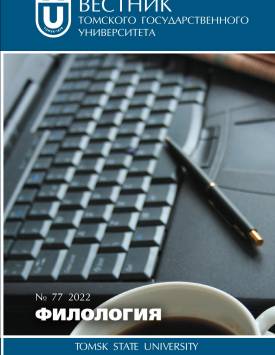Grammatical means of expressing imperativeness in Dukhovnyy Reglament (Spiritual Regulation) (1721): Verb forms
Dukhovnyy Reglament (Spiritual Regulation) (1721) was drawn up during the period of the formation of a new office work system and norms in Russian culture and language. This document is specific since it is straightly related to the church law; therefore, it is of particular importance for the study of the business language of the Peter the Great era and the entire 18th century. The article analyzes one of the main categories of business language - the category of imperativeness. For this purpose, one way of expressing it - the predicate - was explored. A preliminary grammatical and lexical analysis of the Spiritual Regulation language revealed the widespread use of church literary elements and the elimination of archaic Church Slavonic phenomena. This feature made it possible to more accurately characterize the tradition of using verb forms in the text. The repertoire of verb forms used in the Regulation shows an orientation towards the church literary tradition. This is indicated, first of all, by the stable use of the present and future tense forms of verbs with the particle da, which, in the literature of previous centuries, are found in monuments with predominant church Slavonic language elements. The influence of the church literary tradition is also observed in the character of modal operators used with infinitives (for example, the verb podobati), which differs from the secular documents of Peter the Great’s period. At the same time, the Spiritual Regulation recorded the use of the subjunctive mood. It was not characteristic of Church Slavonic business language and was based on colloquial language widely used in business language in the 16th-17th centuries. These forms are sharply reduced in Pribavlenie k Dukhovnomu reglamentu (Addition to the Spiritual Regulation) - a part of the document re-edited after the publication and republished in 1722. The comparative research of the main corpus of the Spiritual Regulation and the Addition revealed a tendency towards the church literary tradition (in particular, an increased use of the present and future tense forms of verbs with the particle da) in the latter. This could cause the reduction in using the subjunctive mood in the Addition. The most widespread means of expressing imperativeness in the Spiritual Regulation is an infinitive sentence. This may indicate the influence of the secular documents of Peter the Great’s time on the language of the document under study. In general, the repertoire of the verb forms used in the Spiritual Regulation distinguishes it from other documents of that time, which confirms the special position of the monument itself and the Orthodox Church in the system of government. The author declares no conflicts of interests.
Keywords
Spiritual Regulation, business language, Peter the Great’s era, imperativeness, verb, Russian language of 18th centuryAuthors
| Name | Organization | |
| Sharikhina Miliausha G. | Institute for Linguistic Studies of the Russian Academy of Sciences | justmilya@yandex.ru |
References

Grammatical means of expressing imperativeness in Dukhovnyy Reglament (Spiritual Regulation) (1721): Verb forms | Vestnik Tomskogo gosudarstvennogo universiteta. Filologiya – Tomsk State University Journal of Philology. 2022. № 77. DOI: 10.17223/19986645/77/4
